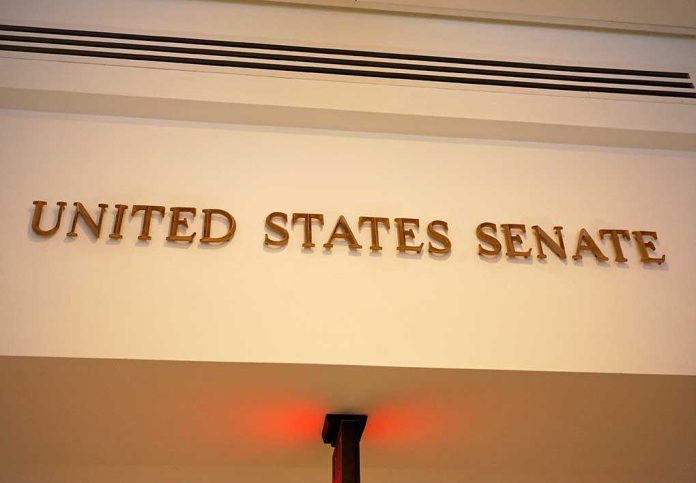
Senators left America’s military and essential federal workers in the lurch, and for those caught in the political crossfire, the question isn’t who wins, but who pays the price.
Story Snapshot
- Senate Democrats blocked a GOP bill that would have paid troops and certain federal employees during the prolonged government shutdown.
- The fight centers on whether the Trump administration should have discretion over which workers get paid.
- Both parties traded accusations of political gamesmanship as the shutdown entered its third week.
- Military families and essential workers now face the real prospect of missing paychecks, with no immediate end in sight.
Senate Showdown Leaves Military Pay in Jeopardy
On a Thursday thick with tension, the Senate failed to clear the 60-vote hurdle for the Shutdown Fairness Act, a Republican-backed measure intended to pay “excepted” federal employees, service members, and contractors while the government remains shuttered. The vote, 54-45, was short by six, with nearly all Democrats voting no. Their argument: the bill would let the Trump administration pick and choose which federal employees are paid, injecting political discretion into federal paychecks. For many watching, this was more than legislative sausage-making; it was a test of who Congress stands with when the lights go out in Washington.
The bill’s sponsor, Sen. Ron Johnson of Wisconsin, argued that leaving military families and essential workers unpaid was indefensible. Supporters, including Sen. Kevin Cramer, framed Democratic opposition as “absurd obstruction” and warned that the stakes were bigger than politics. Military pay during shutdowns has always been a political pressure point, but this time, the government had been closed for over three weeks, and patience was running thin both inside and outside the Beltway.
Partisan Deadlock and Executive Power Concerns
Democrats, led by Sen. Chuck Schumer, countered that the bill’s real flaw was the discretion it handed the Trump administration. By allowing the executive branch to determine which employees are “excepted” and thus eligible for pay, the legislation could politicize who gets a paycheck and who doesn’t. They favored reopening the entire government, with funding for all workers and safeguards against executive overreach. The Republican bill, they argued, gave too much power to the White House at a moment when trust was already low. Three Democrats—Ossoff, Warnock, and Fetterman—broke ranks to support the bill, but this rare show of bipartisanship was not enough to tip the scales.
While the debate raged, the Trump administration floated the idea of using alternative Pentagon funds to pay troops, a move that raised eyebrows about the flexibility—and the limits—of executive power during a fiscal crisis. The Senate’s 60-vote requirement for most legislation meant that, without genuine cross-party agreement, no solution could break free from the procedural gridlock.
History Repeats, But the Stakes Feel Higher
Shutdowns have always been a high-wire act, but this one felt different. Previous standoffs—like those in 2013 and 2018—had seen similar attempts to protect military and essential worker pay, only to be derailed by partisan standoffs. This time, the prolonged closure and repeated failure of stopgap funding measures have amplified the uncertainty for nearly a million federal workers and contractors. The bill’s exclusion of certain groups, such as some Coast Guard and National Guard members, added further controversy among those left out of the debate.
For military families and essential workers, the consequences are immediate. Missing paychecks mean missed mortgage payments, late bills, and mounting stress. Advocacy groups warn that morale and retention could suffer, with long-term impacts on military readiness and federal agency stability. Communities that depend on federal payrolls feel the ripple effects, as local economies brace for the fallout.
Expert Perspectives and the Road Ahead
Military advocacy groups and policy analysts agree: the longer the shutdown drags on, the greater the risk to morale, financial stability, and public trust in government. Labor economists point to the broader economic risks, as delays in paychecks for hundreds of thousands of workers threaten to disrupt local economies and essential services. Scholars emphasize the constitutional and procedural complexities of shutdown management, noting that the Senate’s filibuster rules and the executive’s emergency powers are both under the microscope.
Republicans maintain that their bill was a pragmatic attempt to shield those on the front lines. Democrats insist that any solution must protect all workers and check executive discretion. Both sides claim principle, but the reality is that the people most affected—the military families and essential federal workers—remain pawns in a larger game. With no solution in sight and the shutdown dragging on, the question hangs in the air: how long can those who serve the country be expected to serve without pay?
Sources:
Task & Purpose: “Senate fails to pass bill that would have paid troops during shutdown”
House GOP Vets: Asks Senate Democrat Vets to Pay Our Troops




